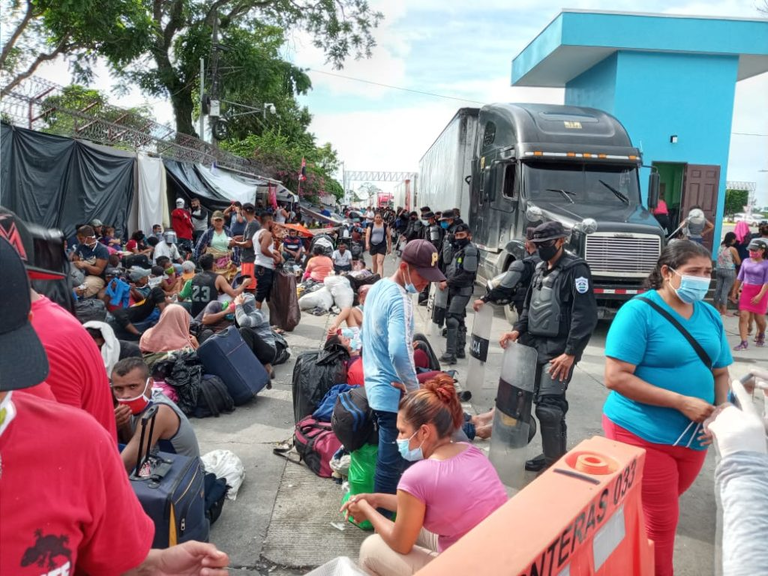The Nicaraguan government blocks the return of hundreds of citizens to the country
Washington, D.C., July 31, 2020. Hundreds of Nicaraguans have been stranded at the border between Costa Rica and Nicaragua for more than ten days, blocked from re-entering their home country […]

Washington, D.C., July 31, 2020. Hundreds of Nicaraguans have been stranded at the border between Costa Rica and Nicaragua for more than ten days, blocked from re-entering their home country by Nicaraguan authorities’ demand that they undergo a COVID-19 test. The migrants are unable to pay the cost of the test.
Human rights organizations report that approximately 300 people are living outdoors with no access to food and poor hygiene. The migrants have crossed into Nicaraguan territory and cannot turn back to Costa Rica, nor can they pass through Nicaraguan border control until they provide a negative test. Among the group are children, elderly adults, and pregnant women, all of whom are now exposed to COVID-19 in conditions where basic sanitation and hygiene measures are impossible.
Costa Rican authorities announced yesterday that civil society groups succeeded in raising private funds to pay for all the migrants’ tests; these results are expected within 48 hours.
Inhumane conditions
“They are in completely inhumane and unlivable conditions. They do not have even the most basic access to potable water, to places to sleep, to dignified shelter. They are sleeping under tarps or below black plastic that heats up in the sun,” reported Braulio Abarca, a member of the Colectivo de Derechos Humanos Nunca Más (Never Again Human Rights Collective) who has spent several days at the border.
According to Abarca, not only has the State of Nicaragua blocked its citizens’ passage into the country, but police and soldiers who guard the border have violently manhandled the migrants. Guards have prevented the migrants from speaking to journalists or human rights activists and broken up efforts by the migrants to organize themselves and elect leaders.
Fabián Flores, one of the Nicaraguans stranded at the border, was able to speak to a journalist from Nicaragua Actual and said, “We want to return home. If the problem is roadblocks and protests, well, there are no more protests. If the issue is with the Ministry of Health, then they should be sending qualified personnel, not police and riot squads who aren’t going to solve anything. What they should be sending are doctors who will address the conditions we’re living in, if they actually care about health measures.”
The Nicaraguan Center for Human Rights (CENIDH, in Spanish) has demanded that the government address the situation at the Peñas Blancas border crossing, where conditions are particularly dire and migrants are at high risk of contracting the virus.
Migrants forced to find other paths
Over 500 people have approached the Nicaraguan border in recent days, but the authorities’ refusal to grant them entry has forced them to seek other paths into the country or back into their host countries. “There are people risking their lives and risking their safety by leaving [the border zone] irregularly. We don’t know how they are doing it, or in what conditions; we don’t even know if they are making it to their destinations successfully,” said Abarca.
Some have opted to return to Costa Rica after the Costa Rican government announced a process under which people refused entry into Nicaragua can petition to be allowed back into Costa Rica. The process, however, requires case-by-case evaluations and is not viable for many migrants who found themselves unemployed in Costa Rica.
According to Article 31 of the Nicaraguan Constitution, citizens have the right to enter and exit the country freely. United Nations High Commissioner for Human Rights Michelle Bachelet recently stated that “when migrants wish to return home voluntarily, governments have the obligation to receive them and ensure that they have access to healthcare and other rights.” She also emphasized that “migrants who return to their countries of origin should be included without discrimination in national policies for response, protection, and recovery, and they should be protected from stigmatization and marginalization in both public and private life.”
The Office of the High Commissioner for Human Rights has calculated that approximately 850 migrants were stranded before July 27th on the borders of Nicaragua, Costa Rica, Panama, and Guatemala.
Statement
Race & Equality demands that the right of Nicaraguans to enter their home country be respected, particularly given the COVID-19 pandemic which exposes migrants to serious risks. We demand that the State of Nicaragua offer free COVID-19 tests and facilitate the rapid re-entry of Nicaraguans stranded in other countries or at the border. These measures are necessary to comply with the State’s obligations regarding the human right to health.

